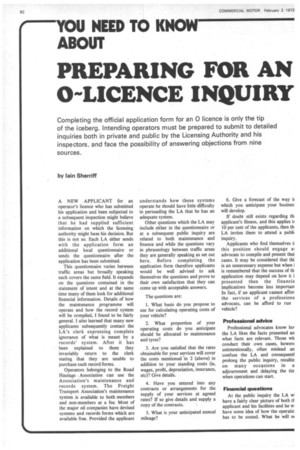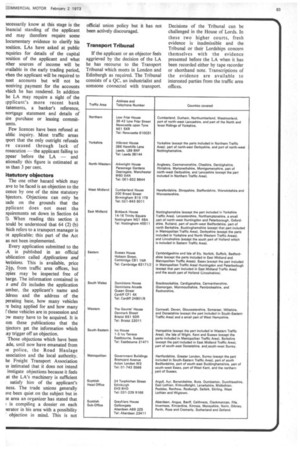PREPARING FOR AN 0-LICENCE INQUIRY
Page 84

Page 85

If you've noticed an error in this article please click here to report it so we can fix it.
A NEW APPLICANT for an operator's licence who has submitted his application and been subjected to a subsequent inspection might believe that he had supplied sufficient information on which the licensing authority might base his decision. But this is not so. Each LA either sends with the application form an additional local questionnaire or sends the questionnaire after the application has been submitted.
This questionnaire varies between traffic areas but broadly speaking each covers the same field. It expands on the questions contained in the statement of intent and at the same time many of them look for additional financial information. Details of how the maintenance programme will operate and how the record system will be compiled, I found to be fairly general. I also learned that many new applicants subsequently contact the LA's clerk expressing complete ignorance of what is meant by a records' system. After it has been explained to them they invariably return to the clerk stating that they are unable to purchase such record forms.
Operators belonging to the Road Haulage Association can use the Association's maintenance and records system. The Freight Transport Association's maintenance system is available to both members and non-members at a fee. Most of the major oil companies have devised systems and records forms which are available free. Provided the applicant understands how these systems operate he should have little difficulty in persuading the LA that he has an adequate system.
Other questions which the LA may include either in the questionnaire or at a subsequent public inquiry are related to both maintenance and finance and while the questions vary in phraseology between traffic areas they are generally speaking as set out here. Before completing the application form therefore applicants would be well advised to ask themselves the questions and prove to their own satisfaction that they can come up with acceptable answers.
The questions are: I. What basis do you propose to use for calculating operating costs of your vehicle?
2. What proportion of your operating costs do you anticipate should be allocated to maintenance and tyres?
3. Are you satisfied that the rates obtainable for your services will cover the costs mentioned 'in 2 (above) in addition to your standing costs (ie, wages, profit, depreciation, insurance, etc)? Give details.
4. Have you entered into any contracts or arrangements for the supply of your services at agreed rates? If so give details and supply a copy of the contracts.
5. What is your anticipated annual mileage?
6. Give a forecast of the way ii which you anticipate your busines will develop.
If doubt still exists regarding th, applicant's fitness, and this applies b 10 per cent of the applicants, then th LA invites them to attend a publi, inquiry.
Applicants who find themselves ia this position should engage a] advocate to compile and present thei cases. It may be considered that thi is an unnecessary expense but when i is remembered that the success of th application may depend on how it i presented then the financia implications become less importani In fact, if an applicant cannot affor the services of a professions advocate, can he afford to run vehicle?
Professional advice Professional advocates know ho, the LA likes the facts presented an what facts are relevant. Those wh conduct their own cases, howev( unintentionally, often mislead an confuse the LA and consequent] prolong the public inquiry, resultir on many occasions in a adjournment and delaying the tin when operations can start.
Financial questions At the public inquiry the LA w have a fairly clear picture of both tt applicant and his facilities and he w have some idea of how the operatic has to be costed. What he will ni lecessarily know at this stage is the inancial standing of the applicant ind may therefore require some locumentary evidence to clarify his )osition. LAs have asked at public nquiries for details of the capital )osition of the applicant and what )ther sources of income will be mailable in the early trading period, vhen the applicant will be required to fleet accounts but will not be =Ming payment for the accounts vhich he has rendered. In addition he LA may require a sight of the ipplicant's more recent bank tatements, a banker's reference, nortgage statement and details of Lire purchase or leasing committents.
Few licences have been refused at ublic inquiry. Most traffic areas port that the only outright refusals re caused through lack of rosecution — the applicant failing to ppear before the LA — and ationally this figure is estimated at ss than 3 per cent.
ltatutory objectors
The one other hazard which may ave to be faced is an objection to the cence by one of the nine statutory bjectors. Objections can only be lade on the grounds that the pplicant does not meet the quirements set down in Section 64 !). When reading this section it iould be understood that 64 (2) (b) hich refers to a transport manager is at applicable; this part of the Act as not been implemented.
Every application submitted to the A is published in an official ublication called Applications and )ecisions. This is available, price 249, from traffic area offices, but apies may be inspected free of harge. The information contained in s and Ds includes the application umber, the applicant's name and. idress and the address of the perating base, how many vehicles "e being applied for and how many r these vehicles are in possession and aw many have to be acquired. It is om these publications that the ajectors get the information which .ay trigger off an objection.
Those objections which have been ade, until now have emanated from Le police, the Road Haulage ssociation and the local authority. he Freight Transport Association is intimated that it does not intend instigate objections because it feels at the LA's machinery is sufficient satisfy him of the applicant's ness. The trade unions generally tve been quiet on the subject but in le area an organizer has stated that is compiling a dossier on each )erator in his area with a possibility objection in mind. This is not official union policy but it has not been actively discouraged.
Transport Tribunal
If the applicant or an objector feels aggrieved by the decision of the LA he has recourse to the Transport Tribunal which meets in London and Edinburgh as required. The Tribunal consists of a QC, an industrialist and someone connected with transport. Decisions of the Tribunal can be challenged in the House of Lords. In these two higher courts, fresh evidence is inadmissible and the Tribunal or their Lordships concern themselves with the evidence presented before the LA when it has been recorded either by tape recorder or shorthand note. Transcriptions of the evidence are available to interested parties from the traffic area offices.
















































































































































